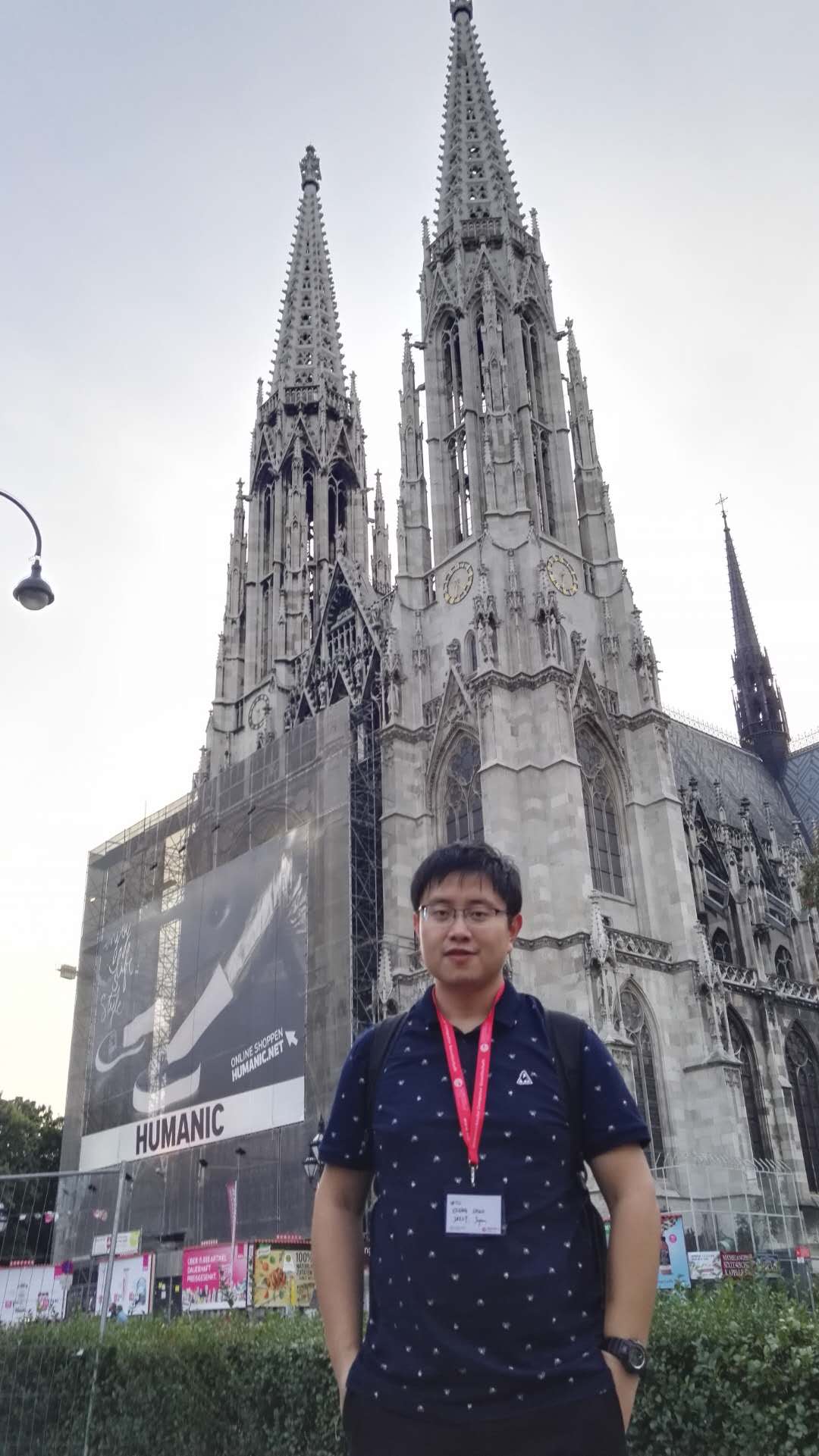

讲师 硕士生导师
xiongshuo@hust.edu.cn
基本情况
华中科技大学新闻与信息传播学院讲师,具有六年多的日本学习研究经历,致力于游戏学研究,学生时代多次发表论文并参加国际学术会议发表,拥有良好的国际视野。主持过两项日本的青年基金项目并担任日本学术振兴会的特别研究员,并在日本多次受到奖励。
研究方向与兴趣
游戏信息学,游戏数学和策划,游戏智能与博弈论,游戏媒体市场与文化,LaTeX排版
个人经历
2018.1 - 现在: 华中科技大学大学新闻与信息传播学院, 讲师
2016.4 - 2018.3: 日本学术振兴会(JSPS)特别研究员 DC2,PD
2017.10 - 2018.1: 日本国立大学法人 北陆先端科学技术大学院大学(JAIST), 博士后研究员
2015.4 - 2017.9: 日本国立大学法人 北陆先端科学技术大学院大学(JAIST), 博士
导师: 饭田弘之, 副课题导师:中村 彰宪(立命馆大学)
2014.2-2014.3 加州大学戴维斯分校访问
2013.4 - 2015.3: 日本国立大学法人 北陆先端科学技术大学院大学(JAIST), 硕士
导师: 饭田弘之
2007.9 - 2011.6: 华中科技大学(HUST) 计算机科学与技术学院 学士
获奖
日本学術振興会,特别研究员研究奖励费
公益財団法人 NEC C&C財団,外国人青年研究员奖励
科研课题
2016—2018 游戏精炼理论与其应用——游戏设计论的新范式
日本学术振兴会DC2-PD特别研究员项目 130万日元 主持,结项
2017—2018 人工智能的新挑战「狼人游戏」开发以及通过游戏精炼理论对其评估
日本研究据点形成支援事业 130万日元 主持,结项
学术活动与成果
[1] Shuo Xiong, Wenlin Li, Xingting Mao, and Hiroyuki Iida. (2017, December). Mafia Game Setting Research Using Game Refinement Measurement. In International Conference on Advances in Computer Entertainment (pp. 830-846). Springer, Cham. London, UK, 2017.
[2] Shuo Xiong, Long Zuo, and Hiroyuki Iida. (2017, November). Individual game information evaluation using signal processing measurement. In Systems and Informatics (ICSAI), 2017 4th International Conference on (pp. 1400-1404). IEEE. Hangzhou, China, 2017.
[3] Long Zuo., Shuo Xiong., & Hiroyuki Iida. (2017, November). An analysis of hotel loyalty program with a focus on the tiers and points system. In Systems and Informatics (ICSAI), 2017 4th International Conference on (pp. 507-512). IEEE. Hangzhou, China, 2017.
[4] Shuo Xiong, Long Zuo, and Hiroyuki Iida. (2017). Possible Interpretations for Game Refinement Measure. In International Conference on Entertainment Computing. Springer International Publishing. Tsukuba, Japan. Sep. 2017
[5] Long Zuo, Shuo Xiong and Hiroyuki Iida. (2017). An Analysis of DOTA2 using Game Refinement Measurement. In International Conference on Entertainment Computing. Springer International Publishing. Tsukuba, Japan. Sep. 2017
[6] Nhien Pham Hoang Bao, Shuo Xiong, and Hiroyuki Iida. (2017). Reaper Tournament System. In International Conference on Intelligent Technologies for Interactive Entertainment. Springer. Funchal, Portugal. June. 2017
[7] Shuo Xiong, Ying Peng, Hiroyuki Iida and Nordin Abu-Bakar. (2016). An Approach to Entertainment Tuning in RPGs: Case Study Using Diablo III and Trails of Cold Steel. In Games and Learning Alliance (pp. 385-394). Springer International Publishing. Utrecht, Netherlands. Dec. 2016
[8] Shuo Xiong, Parth Pankaj Tiwary, and Hiroyuki Iida. (2016). Solving the Sophistication-Population Paradox of Game Refinement Theory. In International Conference on Entertainment Computing (pp. 266-271). Springer International Publishing. Vienna, Austria. Sep. 2016
[9] Shuo Xiong, Liang Yang, Nor Azan Mat Zin, and Hiroyuki Iida. (2016). Ranking Accuracy and Popularity Promotion: case study using UEFA Euro 2016. 3rd International Conference on Systems and Informatics. Shanghai, China. Nov. 2016
[10] Mingyang Wu, Shuo Xiong, and Hiroyuki Iida. (2016). The fairness mechanism in MOBA games. 3rd International Conference on Systems and Informatics. Shanghai, China. Nov. 2016
[11] Panumate. Chetprayoon, Shuo Xiong, and Hiroyuki Iida. (2015). An Approach to Quantifying Pokemons Entertainment Impact with focus on Battle. The 3rd International Conference on Applied Computing & Information Technology, (pp. 60-66). IEEE. Okayama, Japan. July. 2015
[12] Panumate. Chetprayoon, Shuo Xiong, Hiroyuki Iida, and Toshiaki Kondo. (2015).
Evolutionary Changes of Pokemon Game: A Case Study with Focus On Catching Pokemon. In International Conference on Entertainment Computing (pp. 182-194). Springer International Publishing. Trondheim, Norway. Sep. 2015
[13] Shuo Xiong, Hiroyuki Iida (2014). Attractiveness of real time strategy games. In Systems and Informatics (ICSAI), 2014 2nd International Conference on (pp. 271-276). IEEE. Shanghai, China. Nov. 2014
[14] Shuo Xiong, Long Zuo and Hiroyuki Iida. (2014). Quantifying Engagement of Electronic Sports Game. Advances in Social and Behavioral Sciences Vols.5-6, (pp. 37-42). Hongkong, China. Dec. 2014
[15] Shuo Xiong, Xinting Mao, Wenlin Li and Hiroyuki Iida. (2017). Finding Comfortable Settings of Mafia Game: using Game Refinement Measurement. Information Processing Society of Japan, the 38th GI research. Okayama, Japan. July. 2017
[16] Bhargav Chauhan, Shuo Xiong, and Hiroyuki Iida. (2015). Game Refinement and Utility-Fun Function: Application to Card Games. The 20th Game Programming Workshop Processding (pp. 138-141). Karuizawa, Japan. Nov. 2015
[17] Shuo Xiong, Long Zuo, and Hiroyuki Iida. (2014). Quantifying engagement of electronic sports game. Advances in Social and Behavioral Sciences, 5, 37-42.
[18] Shuo Xiong, Long Zuo, Rachaya Chiewvanichakorn and Hiroyuki Iida. (2014). Quantifying engagement of various games. In The 19th Game Programming Workshop 2014. (PP. 101-106) Information Processing Society of Japan. Hakone, Japan. Nov. 2014
[19] Shuo Xiong (2012). The Japanese and Chinese Game Secluding From the Outside World and Countermeasure for Dealing with the Situation. Digital Games Research Association Japan 2012 Annual Conference. (PP. 66-75). Fukuoka, Japan. Mar. 2013
[20] Shuo Xiong, He Zahi, Long Zuo, Mingyang Wu, and Hiroyuki Iida. (2015). Analysis of the ``Heroes of the Storm''. Advances in Computer Science: an International Journal, 4(6), 79-82. Journal. Dec. 2015
[21] Shuo Xiong, Hiroyuki Iida (2015). Attractiveness of Real Time Strategy Games. Computer Science and Information Systems, Vol. 12, No. 4, (PP. 1217-1234), 2014. Journal. Nov. 2015
[22] Shuo Xiong (2014). The Problems With Modern Japanese and Chinese Game Seclusion From the Outside World and In-depth Analysis of the Countermeasures. Journal of US-China Public Administration, 11(4): (PP. 334-344), 2014. Journal. Sep. 2014
非学术兼职活动经历
2012. 三国志12汉化组,系统翻译
2013-2014 信长之野望14 汉化组,系统翻译,历史事件剧情翻译